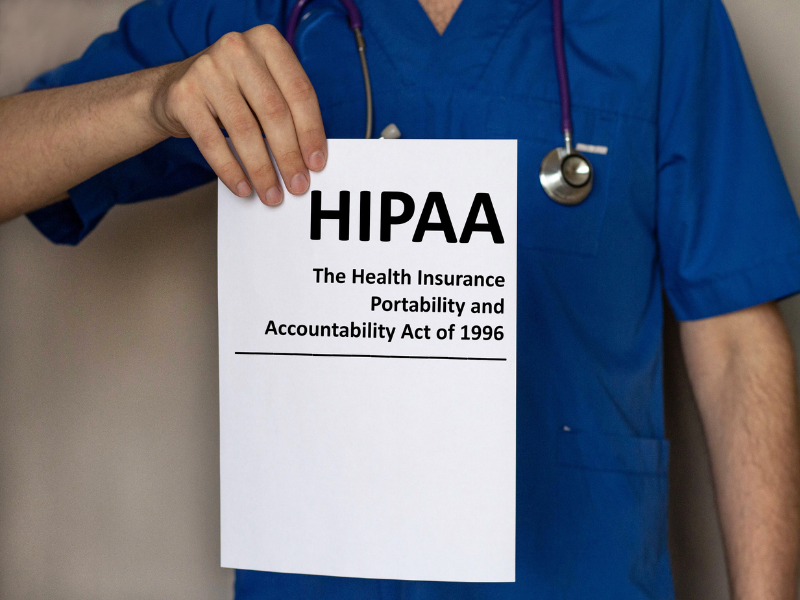Privacy and security of sensitive medical information have become crucial in today’s dynamic healthcare environment. HIPAA stands as an indispensable means of safeguarding patient privacy. However, comprehending the intricacies of HIPAA insurance can be daunting for many businesses and companies.
Below, you will gain more insight into what these insurance policies entail by understanding their principles, coverage options, and types. You will also come to know why HIPAA compliance insurance is necessary to reduce the costs of responding to healthcare data breaches.
Table of Contents

What Is HIPAA Insurance?
HIPAA insurance plans are insurance coverages that adhere to the regulations set forth by the Health Insurance Portability and Accountability Act of 1996 (HIPAA). These plans prioritize safeguarding covered entities at times when they commit or face the repercussions of HIPAA violations.
Choosing a HIPAA insurance plan can be highly beneficial, especially if your business or organization constantly deals with the handling of protected health information (PHI).
Some of the benefits of getting this type of insurance plan include:
- Breach response assistance: In case of a breach incident, your insurance provider can help reduce the extent of the damage by giving you access to their breach response team.
- Legal representation: If you get involved in lawsuits due to HIPAA non-compliance and PHI data breaches, you can count on your insurance company to provide reliable legal representation.
- Expense reduction: Insurance can help minimize the losses associated with HIPAA violations, including legal fees and monetary fines.
Types of HIPAA Insurance Plans
There are two primary types of HIPAA insurance plans: compliance and liability insurance.
1. HIPAA compliance insurance
This type of insurance plan helps covered entities (CEs) and their business associates (BAs) protect patient health information (PHI) by covering the costs of:
- Assessments to ascertain adherence to HIPAA rules
- Putting into practice remedial measures to rectify any compliance deficiencies
- In the case of a HIPAA breach, legal expenses and settlements
2. HIPAA liability insurance
This type of insurance plan provides financial protection for CEs and BAs in the event of a HIPAA violation that results in patient financial losses, such as:
- Medical expenses
- Lost wages

Best Practices to Improve and Maintain HIPAA Compliance
Here are a few best practices covered entities should adopt to enhance and maintain HIPAA compliance:
- Conduct regular risk analyses to help identify any risks to PHI safety and implement appropriate security measures such as firewalls, encryption, and user access controls.
- Employee training for HIPAA rules and requirements should be mandatory. Everyone in your team or organization handling sensitive patient information should comply with the regulations set by HIPAA.
- Develop an actionable breach response plan and have it ready in case of a data breach. This will allow for quick response time and minimize the potential damages.
- Maintain an efficient system to assess compliance on an ongoing basis, which will enable you to identify any areas for improvement.
Here are a few additional strategies for remaining HIPAA compliant:
- Use strong passwords and update them regularly. Be wary about sharing or disclosing sensitive patient information online.
- Only access PHI from authorized devices
- Follow the guidelines stated for the disposal of medical records and other protected health documents
- Report any suspected HIPAA violations immediately
By adhering to these best practices, your organization can ensure compliance with HIPAA regulations while safeguarding PHI privacy.
Factors to Consider When Choosing a HIPAA Insurance Policy
Here are a few factors to keep in mind when purchasing HIPAA insurance:
- HIPAA insurance policies come in various levels of coverage. Therefore, you must select one that meets your organization’s unique requirements. Some policies only cover legal fees and settlement costs, while others offer comprehensive risk analyses, training sessions, and breach response assistance.
- HIPAA insurance policies vary significantly in price, so it is a good idea to shop around and compare policies before purchasing one. The total cost will depend on various factors such as coverage levels, organization size, complexity, and risk tolerance.
- Be mindful when purchasing HIPAA insurance policies. Read their terms and conditions carefully to understand which coverage may or may not exist under each plan. Some policies may even exclude specific losses, such as punitive damages.
- Select an insurance provider with an excellent track record. Remember to exercise due diligence when choosing an insurer based on their financial stability and past claims payments.

The Scope of Coverage of a HIPAA Insurance Policy
Generally speaking, a wide range of topics linked to safeguarding patient confidentiality is included in a HIPAA insurance policy. Key coverage clauses usually consist of the following:
- Legal fees and settlements: If an organization is sued for a HIPAA violation, its insurance coverage will typically pay for the legal defense and settlement costs.
- Risk assessments: Your insurance may pay for the expenses of performing risk studies that assist covered companies in identifying and minimizing HIPAA breaches. It may also pay for the costs of educating staff members about the requirements.
- Breach response planning: Many plans pay for the expenses associated with breach response planning, enabling the covered entities to react quickly and effectively in the event of data breaches.
Some HIPAA insurance policies may also cover additional expenses, including:
- Public relations: Should a covered entity experience a HIPAA violation, its insurance policy may cover costs related to public relations efforts to help mitigate the reputational damages.
- Data restoration: This coverage could help pay the data restoration, repair, and reinstatement costs, provided that the covered entity’s insurance policy includes coverage for cyber incidents.
Before purchasing HIPAA insurance policies, carefully review what each policy covers and whether it is aligned with your organization’s specific requirements and risk profile.
HIPAA Insurance: Safeguarding Privacy and Preserving Reputation
Any business handling protected health information is required to adhere to HIPAA regulations. After all, a HIPAA breach may have severe consequences, including monetary penalties, legal responsibilities, and reputational damages.
You can lessen your exposure to these dangers with the help of HIPAA insurance. It can pay for settlements and legal bills and minimize the expenses associated with risk assessments, public relations, and breach response processes. Whether you are a covered entity or business associate, getting HIPAA insurance is best done as soon as possible.







